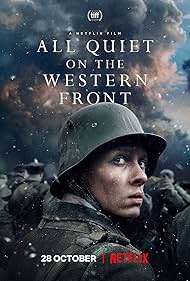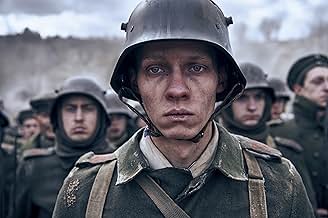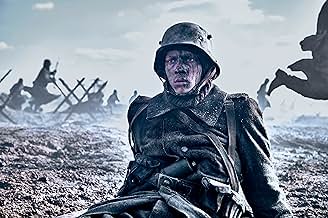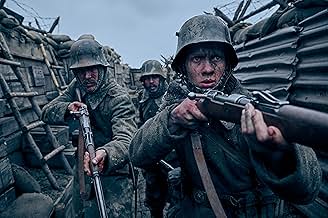A young German soldier's terrifying experiences and distress on the western front during World War I.A young German soldier's terrifying experiences and distress on the western front during World War I.A young German soldier's terrifying experiences and distress on the western front during World War I.
- Won 4 Oscars
- 59 wins & 89 nominations total
Featured reviews
Germany, May 1917. 17-year-old Paul Baumer enthusiastically enlists in the German army and heads off to war. His head is filled with patriotism, honour, visions of heroism and the confidence that Germany will win the war. He soon learns that his impressions of war are far from the reality.
Erich Maria Remarque's "All Quiet on the Western Front" was first published in 1929. It was quite revolutionary, depicting the horrific reality of war rather than the glamourous, sanitised version. In a sense it was the first anti-war novel. It was so unflinching in its portrayal of WW1 that the Nazi party regarded it as treasonous and had the book banned and stripped Remarque of his German citizenship, causing him to flee to Switzerland and ultimately the US.
In 1930 Hollywood made the book into a movie. It was superb, capturing well the horrors that Remarque depicted in his book. It deservedly won the Oscar for Best Picture (and Best Director) in 1930.
In 1979 it was adapted again, this time as a made-for-TV movie. Despite being directed by Delbert Mann and boasting a star-studded cast (Richard Thomas, Ernest Borgnine, Ian Holm, Donald Pleasance) this version was far from being in the same league as the 1930 version and didn't do the book justice. It is quite tame and the performances are quite subdued.
This, the 2022 version, once again captures the essence of the book and is quite unflinching in its portrayal of war. Graphic scenes and realistic plot show the wastefulness and horror of war.
Not as good as the 1930 version though: the characters aren't as fully developed, limiting engagement, and the plot feels a bit padded. A few drawn out scenes could easily have been shorter without losing any detail. Some style-over-substance elements too as the director went overboard with the special effects he had at his disposal (the French counter-attack with tanks and flamethrowers is a good example). The droning sound didn't help either (clearly the director has watched Christopher Nolan's "Dunkirk").
Erich Maria Remarque's "All Quiet on the Western Front" was first published in 1929. It was quite revolutionary, depicting the horrific reality of war rather than the glamourous, sanitised version. In a sense it was the first anti-war novel. It was so unflinching in its portrayal of WW1 that the Nazi party regarded it as treasonous and had the book banned and stripped Remarque of his German citizenship, causing him to flee to Switzerland and ultimately the US.
In 1930 Hollywood made the book into a movie. It was superb, capturing well the horrors that Remarque depicted in his book. It deservedly won the Oscar for Best Picture (and Best Director) in 1930.
In 1979 it was adapted again, this time as a made-for-TV movie. Despite being directed by Delbert Mann and boasting a star-studded cast (Richard Thomas, Ernest Borgnine, Ian Holm, Donald Pleasance) this version was far from being in the same league as the 1930 version and didn't do the book justice. It is quite tame and the performances are quite subdued.
This, the 2022 version, once again captures the essence of the book and is quite unflinching in its portrayal of war. Graphic scenes and realistic plot show the wastefulness and horror of war.
Not as good as the 1930 version though: the characters aren't as fully developed, limiting engagement, and the plot feels a bit padded. A few drawn out scenes could easily have been shorter without losing any detail. Some style-over-substance elements too as the director went overboard with the special effects he had at his disposal (the French counter-attack with tanks and flamethrowers is a good example). The droning sound didn't help either (clearly the director has watched Christopher Nolan's "Dunkirk").
In the excellent 1930s original, war is seldom better summarised than by: 'It's dirty and painful to die for your country, when it comes to dying for your country it's better not to die at all. There are millions out there dying for their countries, and what good does it do?'.
It's a statement that applies just as well today, and complimented by this outstanding piece of film making too, which leaves us under no illusions of man's inhumanity to man. The performances are truly incredible, the technical achievement recreating scenes of war outstanding, and the messages as clear as any about the futility of armed combat and the inability of the human race to learn its lessons - even to this day. Not really a film to enjoy, but certainly a film to reflect on how far we haven't come since 1918, especially in a world that often seems so intent on pulling itself apart.
It's a statement that applies just as well today, and complimented by this outstanding piece of film making too, which leaves us under no illusions of man's inhumanity to man. The performances are truly incredible, the technical achievement recreating scenes of war outstanding, and the messages as clear as any about the futility of armed combat and the inability of the human race to learn its lessons - even to this day. Not really a film to enjoy, but certainly a film to reflect on how far we haven't come since 1918, especially in a world that often seems so intent on pulling itself apart.
Oh dear. I still feel bad. But not because the film is bad. Because it shows how incredibly bad that time was. Especially for the young men who were forced to go to war. I'm from Osnabrück - the city where Erich Maria Remarque was born - and when they named the city in the film... my body is still shaking. The actors were amazing. I dont like german films so much, but this is different. The camera, the sound. Its perfect (except one role - otherwise it would be a 10 for me). I even didn't touch my snacks in the cinema. You really have to see this movie. Because it shows the cruel time in a way that perhaps no film has ever done before. However, if you want to spend a nice evening in a good mood, don't watch it. Because it really pulls you down. But it's all worth it. Thanks for this history lesson!
I'm truly conflicted: "All Quiet on The Western Front" is a surprisingly stark & cold film upon first watch, capturing the futility of war, loss of youth & corruption of innocence with an unsettling lack of emotion throughout.
It's something I couldn't help but notice as I tuned in; usually in historical war films (like Sam Mendes' "1917" for instance, following events through the eyes of the opposing British side), we're accustomed to typically witnessing soldier's actions depicted as valiant & honourable, with a palpable sense of pride & patriotism embedded throughout - in pieces which are made to catalogue their innumerable brave achievements conducted by every-day folk (who, through no fault of their own, found themselves in the trenches), in spite of insurmountable odds comprehensively stacked against them... But here, there's no dignity in anything that transpires; obstacles aren't admirably overcome, the ensemble don't conduct themselves in a way which is befitting of their station, worthy of respect & none of the characters win any semblance of what could honestly be described as "glory"... They're just young, impressionable fools - drunk on propaganda - who have mindlessly partaken in the unwarranted military occupation of foreign land, where they are obviously not welcome by the inhabitants. Due to this, there's a void of relatability & moreover, all the team of participants can dream of - once they arrive at the front - or endeavour to guarantee for themselves is survival, not greatness.
However, despite this inability to sympathise being an irksome grievance of mine, in the production's defense, I suppose that's actually intentional & rather the whole point (?), since it's meant to tell the story through the perspective of the vanquished, not the conquerors, reflecting how naive recruits (who'd been fatally misled, in conscripting themselves & their families in the first place) were gradually numbed to their feelings by the constant mental & physical anguish inflicted upon them in a continuous onslaught of pointless offensives (instigated by their generals), once reality had firmly bitten & they'd been collectively disabused of this fantasy - but unfortunately, that noticeable detachment from any of the characters featured results in a somewhat muted response (as a viewer) when they're incessantly chewed up & spat out by the gratuitous violence - that's shot in a hauntingly raw, ominous way - they're repeatedly (& needlessly) thrust in to by the callous, cowardly officers, who arrogantly orchestrate the entire miserable situation that needn't last a single day longer.
Again, I suppose that only reaffirms the statement the creators are trying to make, wilfully juxtaposing intense sequences of suffering & pain with little sentimentality & ambivalence; the film chronicles how Germany treated (or more accurately, mistreated) its own people, offering up generations of its future citizens on the battlefield as sacrificial lambs, massacred at the altar of a poisonous, nationalistic ideology which had taken root within the governing population; boys - barely men, even some who weren't yet - were essentially reduced to nothing but disposable, unimportant objects, thoughtlessly discarded & simply replaced in a sadistic game & quest for absolute power (no matter the personal cost or price paid in blood) - an incalculable loss which (even by the time the armistice came in to effect) still wasn't enough to satiate the tyrannical desires of the few, controlling the many... And the movie does therefore (to its credit) accurately reflect that exact point in its portrayal of the poor cannon fodder by representing them as exactly that, & additionally lenses the apathy of the superiors (who give the indefensible orders) through a perspective of rightful, scornful contempt.
Hence, I can understand the creative intentions (depicting the utter, irredeemable meaninglessness; the wanton, senseless destruction) & the grim inhumanity of it all... Yet after seeing such horrors & heinous cruelties, I guess I felt like I wanted a purpose to everything I'd sat through by the time the credits started rolling - & thought I'd been cheated by the fact that there wasn't one. On the other hand, like I acknowledge earlier, I assume that's not accidental - & rather the understandably cynical, bitter & despondent conclusion the narrative decidedly wants the audience to come to by the time it reaches its unsatisfactory denouement; there is no discernible reason that could ever hope to justify the carnage we observe - the savagery that unfolds is simply slaughter for the sheer sake of it & the trauma experienced by all those affected was utterly preventable, had the invaders put aside their vanity & pride & sought to preserve peace which could've so effortlessly been maintained.
Plus, it does also show one massive miscalculation on the side of the victors; forcing the Germans in to reluctant submission & backing them in to signing an agreement with terms they couldn't accept would ultimately entrench resentful animosity that would act as a spark to light the fire of the 2nd World War, only a few decades later etc. Foreshadowing what was to come before anyone could predict the oncoming calamity. Due to this, irrespective of what I think (or more aptly, how little it evoked within me), I must concede that it remains a success, regardless - because the project undoubtedly achieved its goal in a commendably brutal & unflinching manner - & I can't plausibly surmise any alternative which would've resulted in something better.
It's something I couldn't help but notice as I tuned in; usually in historical war films (like Sam Mendes' "1917" for instance, following events through the eyes of the opposing British side), we're accustomed to typically witnessing soldier's actions depicted as valiant & honourable, with a palpable sense of pride & patriotism embedded throughout - in pieces which are made to catalogue their innumerable brave achievements conducted by every-day folk (who, through no fault of their own, found themselves in the trenches), in spite of insurmountable odds comprehensively stacked against them... But here, there's no dignity in anything that transpires; obstacles aren't admirably overcome, the ensemble don't conduct themselves in a way which is befitting of their station, worthy of respect & none of the characters win any semblance of what could honestly be described as "glory"... They're just young, impressionable fools - drunk on propaganda - who have mindlessly partaken in the unwarranted military occupation of foreign land, where they are obviously not welcome by the inhabitants. Due to this, there's a void of relatability & moreover, all the team of participants can dream of - once they arrive at the front - or endeavour to guarantee for themselves is survival, not greatness.
However, despite this inability to sympathise being an irksome grievance of mine, in the production's defense, I suppose that's actually intentional & rather the whole point (?), since it's meant to tell the story through the perspective of the vanquished, not the conquerors, reflecting how naive recruits (who'd been fatally misled, in conscripting themselves & their families in the first place) were gradually numbed to their feelings by the constant mental & physical anguish inflicted upon them in a continuous onslaught of pointless offensives (instigated by their generals), once reality had firmly bitten & they'd been collectively disabused of this fantasy - but unfortunately, that noticeable detachment from any of the characters featured results in a somewhat muted response (as a viewer) when they're incessantly chewed up & spat out by the gratuitous violence - that's shot in a hauntingly raw, ominous way - they're repeatedly (& needlessly) thrust in to by the callous, cowardly officers, who arrogantly orchestrate the entire miserable situation that needn't last a single day longer.
Again, I suppose that only reaffirms the statement the creators are trying to make, wilfully juxtaposing intense sequences of suffering & pain with little sentimentality & ambivalence; the film chronicles how Germany treated (or more accurately, mistreated) its own people, offering up generations of its future citizens on the battlefield as sacrificial lambs, massacred at the altar of a poisonous, nationalistic ideology which had taken root within the governing population; boys - barely men, even some who weren't yet - were essentially reduced to nothing but disposable, unimportant objects, thoughtlessly discarded & simply replaced in a sadistic game & quest for absolute power (no matter the personal cost or price paid in blood) - an incalculable loss which (even by the time the armistice came in to effect) still wasn't enough to satiate the tyrannical desires of the few, controlling the many... And the movie does therefore (to its credit) accurately reflect that exact point in its portrayal of the poor cannon fodder by representing them as exactly that, & additionally lenses the apathy of the superiors (who give the indefensible orders) through a perspective of rightful, scornful contempt.
Hence, I can understand the creative intentions (depicting the utter, irredeemable meaninglessness; the wanton, senseless destruction) & the grim inhumanity of it all... Yet after seeing such horrors & heinous cruelties, I guess I felt like I wanted a purpose to everything I'd sat through by the time the credits started rolling - & thought I'd been cheated by the fact that there wasn't one. On the other hand, like I acknowledge earlier, I assume that's not accidental - & rather the understandably cynical, bitter & despondent conclusion the narrative decidedly wants the audience to come to by the time it reaches its unsatisfactory denouement; there is no discernible reason that could ever hope to justify the carnage we observe - the savagery that unfolds is simply slaughter for the sheer sake of it & the trauma experienced by all those affected was utterly preventable, had the invaders put aside their vanity & pride & sought to preserve peace which could've so effortlessly been maintained.
Plus, it does also show one massive miscalculation on the side of the victors; forcing the Germans in to reluctant submission & backing them in to signing an agreement with terms they couldn't accept would ultimately entrench resentful animosity that would act as a spark to light the fire of the 2nd World War, only a few decades later etc. Foreshadowing what was to come before anyone could predict the oncoming calamity. Due to this, irrespective of what I think (or more aptly, how little it evoked within me), I must concede that it remains a success, regardless - because the project undoubtedly achieved its goal in a commendably brutal & unflinching manner - & I can't plausibly surmise any alternative which would've resulted in something better.
This is not strictly-speaking an adaption of Erich Maria Remarque's classic. A few minor incidents from the novel are included, but Remarque's biggest contribution to this film is the title. Given the ending of the film (as opposed to the book) the title is somewhat misleading, but it's such a classic that the film-makers' decision is quite understandable.
This is a brutal and uncompromising study of the realities of war. The fact the the war depicted took place more than a hundred years ago doesn't make it any less relevant. It could be shown in Ukraine today, and soldiers on both sides would understand.
Nor is the film's anti-war message terribly new. It is, however, a message that needs to be repeated over and over again, until (maybe) enough people take it seriously.
The battle scenes are appallingly visceral - possibly the best of their type since the opening of Saving Private Ryan.
The history of any war is written by the winners, but that doesn't stop them being a tragedy for the poor grunts on the losing side as well.
This is a brutal and uncompromising study of the realities of war. The fact the the war depicted took place more than a hundred years ago doesn't make it any less relevant. It could be shown in Ukraine today, and soldiers on both sides would understand.
Nor is the film's anti-war message terribly new. It is, however, a message that needs to be repeated over and over again, until (maybe) enough people take it seriously.
The battle scenes are appallingly visceral - possibly the best of their type since the opening of Saving Private Ryan.
The history of any war is written by the winners, but that doesn't stop them being a tragedy for the poor grunts on the losing side as well.
Storyline
Did you know
- TriviaErich Maria Remarque's book was inspired by his own experiences as a German soldier in World War I. Remarque fought in the trenches and the novel is notable for its realistic depiction of the horrors of battle, and the trouble soldiers face during and even after the fighting.
- GoofsBy the end, Germany's delegation to Rethondes appears indignant as the terms and conditions of armistice are quoted by Mathias Erzberger, namely forfeiting submarines, planes, weapons and so on; what is read there was not in the November 11, 1918 capitulation act but was imposed upon Germany next year in the Treaty of Versailles.
- Quotes
Matthias Erzberger: All that's left separating us from an armistice is false pride.
- ConnectionsFeatured in Business Now: Episode dated 19 October 2022 (2022)
- SoundtracksEbben? Ne andrò lontana ('La Wally', Act 1)
Written by Alfredo Catalani and Luigi Illica
Performed by Maria Luigia Borsi
Details
- Release date
- Countries of origin
- Official site
- Languages
- Also known as
- Sin novedad en el frente
- Filming locations
- Production companies
- See more company credits at IMDbPro
- Runtime2 hours 28 minutes
- Color
- Sound mix
- Aspect ratio
- 2.39 : 1
Contribute to this page
Suggest an edit or add missing content


































